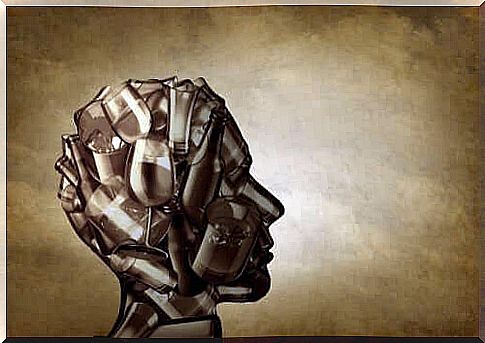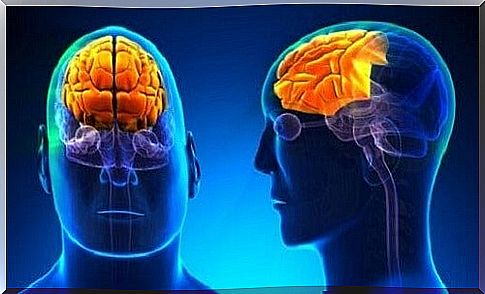The Neurobiology Of Alcoholism

There are neuroanatomical and neurofunctional structures to explain human behaviour. Similarly, we also have the neurobiology of alcoholism. In this article we will explain what happens in the brain of someone with an alcohol addiction.
Alcohol is the most widely used legal drug. It is also a major social and economic burden on society. In addition, alcohol is capable of inducing physical and psychological dependence.
According to the World Health Organization, alcoholism affects 140 million people worldwide. It is the fifth most common cause of premature death.
Many diseases and conditions are also associated with alcohol consumption. This ranges from tuberculosis to HIV and infections. So what happens in the brain after alcohol intake? The question is especially when there is a problem of dependency. That’s where the neurobiology of alcoholism comes in.
The neurobiology of alcoholism explained
The cause and development of alcoholism involve a complex interaction between biological, psychological, social and environmental factors.
The most reliable elements that predict whether someone will become dependent are genetic or hereditary factors. The innate property of a person to suffer from alcoholism applies in 60% of the cases.

From a biochemical standpoint, there is a link between the risk of alcohol dependence and variations in the genes. These are those genes that encode proteins composed of specifically two enzymes: alcohol dehydrogenase and aldehyde dehydrogenase.
However, in addition to the possible hereditary origin, scientists also suspect other possible causes. This can be, for example, a decrease in the level of the MAO-A enzyme (mono-amino-oxidase type A). Some people experience this after going through traumatic events.
There are, of course, other possible explanations for the cause of more normal forms of behavioral alcoholism. These have to do with learning experiences and personality traits.
The effects are the same but at a different level than at the neurobiological level. At the same time , there is a direct connection.
Hormones and neurotransmitters in the neurobiology of alcoholism
Scientists have shown that alcohol can interact directly or indirectly with a wide range of neurotransmitters in the nervous system.
That interaction occurs due to the fat-dissolving nature of alcohol. This property ensures that the alcohol crosses the blood-brain barrier and thus reaches the brain.
These are the neurotransmitters and hormones that are sensitive to the interaction with ethyl alcohol:
- GABA
- glutamate
- Endogenous Opioids
- dopamine
- Adrenaline and noradrenaline
- Acetylcholine
- Serotonin
- cannabinoids
- Corticotroprin-releasing factor (CLF)
- Neuropeptide Y

Alcohol dependence is a deficit in the physiological regulatory capacity of our endogenous motivation and reward systems. Multiple brain structures are responsible for these systems that influence human behavior.
We are talking about systems like the limbic system, the amygdala, the hippocampus, the caudate nucleus, the nucleus accumbens, and the frontal lobe. So there may be a link between a disorder in these systems and alcohol dependence, alcohol intoxication or withdrawal symptoms.
The Effects of Alcoholism
Alcohol consumption has a disinhibiting effect and a depressant effect on the central nervous system. The first effect is characterized by a blockage and a change in brain structure. In addition, there are also processes that have to do with thinking, thinking, or ethical values, among other things.
In this way, some very relevant cognitive function gets affected more or less forever. These include executive functions (cognitive processes associated with behavior) of the frontal lobes, memory problems, visual-spatial impairment, and motor control and eye motor problems.
The disinhibiting effect
The disinhibiting effect of alcohol causes the person to behave in a way that they would not behave if they were sober. Alcohol can also give a temporary feeling of freedom, empathy and amplified emotions.
In general, alcohol dependence can be explained by the positive reinforcing effects that alcohol consumption produces in the brain. The intake of this substance activates the reward system of the brain. In particular, it creates pleasant sensations that lead the brain to want to use more.
However, for people who suffer from alcoholism, there are many resources and resources available. The best first step is to see a doctor to start the alcohol detox process.
As you can see, neurobiology explains the how and when of the behavior behind alcohol abuse. The “why” is much harder to explain. However, we must continue to hope that the many existing approaches can be of great help to the people who suffer from this terrible addiction.









